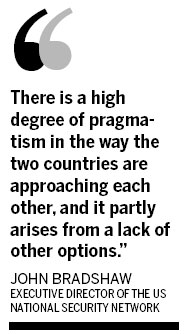US, Iran share common ground in Middle East
To Iran, the United States was the "Great Satan", while Washington slammed Teheran as a "rogue state" that was part of an "axis of evil."
But as chaos engulfs the Middle East, the two are cautiously eyeing ways to work together.
An ideological chasm separates the Shiite Islamic republic from its long-time enemy in the West, yet overlapping concerns from Afghanistan to Syria and even Iraq are sowing the seeds of a hesitant rapprochement.
Restoring full diplomatic ties, severed some 35 years ago amid the 1979 storming of the US embassy in Teheran and the painful 444-day hostage-taking, remains far off on a distant horizon.
But the willingness of the Obama administration to engage in secret negotiations in Oman last year and the new leadership of Iranian President Hassan Rouhani have already borne fruit, facilitating an interim deal in November on reining in Iran's nuclear program.
"There is a high degree of pragmatism in the way the two countries are approaching each other, and it partly arises from a lack of other options," said John Bradshaw, executive director of the US National Security Network.
"The US has strong allies, like Israel, but is looking to find other pragmatic ways to help us achieve our goals," he said.

Afghanistan is one place where the concerns of both countries converge, with neither wanting to see the Taliban regain power.
And there is historic precedent, said Alireza Nader, senior international policy analyst with the Rand Corporation, pointing to their cooperation in setting up a post-Taliban government in 2001 and 2002.
Both countries are also "concerned about narcotics emanating from Afghanistan. That is a huge problem for Iran," he said.
"If the nuclear issue is resolved, I see that possibly as the best case for cooperation."
Syria is another theater where, despite being on opposite ends of the conflict, both want to see an end to the fighting and thwart any rise by extremist Sunni al-Qaida militants.
Top US diplomat John Kerry has hinted that despite Iran's fully-fledged support for Syrian President Bashar al-Assad, which has included plying him with arms, cash and military advisers, Teheran might be able to play a role on the sidelines of Syria peace talks later this month.
Using its sway over Damascus to halt the bombardments of civilians and open up humanitarian corridors would be a way for Teheran to show that it aims to be a constructive player, US officials have said.
But while Washington is motivated by ending the fighting and ousting long-time foe Assad, Iran wants to retain its hold over a country that has long been a conduit to funnel weapons to Lebanon-based Hezbollah militants, seen as a front against the US' staunch ally, Israel.
Mutual opposition to the rise of al-Qaida extremists could also lead to a paradoxical cooperation in Iraq.
Iran's deputy chief of staff General Mohammad Hejazi has said that his country is prepared to provide military equipment and advice to Iraq to help it flush al-Qaida out of Anbar province.
Bradshaw said, "As a country that is trying to develop economically, and is becoming more of a pragmatic player, regionally and globally, they (Iranians) have a strong interest in seeing that Sunni extremism, al-Qaida and other groups, are not a destabilizing factor for them and the region."
It's clear though that driving both the US and Iranian agendas is a singular desire to shore up their own influence in a region convulsed by recent political upheavals.
"Both countries are still in competition for the Middle East," said Nader, and while they might be able to cooperate, that "does not mean that the US and Iran become allies, rather it is just a potential process of engaging each other to resolve some regional issues."
Agence France-Presse
(China Daily 01/13/2014 page11)














